SCHILLER INSTITUTE CONFERENCE
Building A World Land-Bridge:
Realizing Mankind's True Humanity
Thursday, April 7, 2016, 9:00am - 9:30pm
NEW YORK CITY
Keynote Address by Helga Zepp-LaRouche
Program and video
Invitation
A PDF version of this transcript appears in the April 15, 2016 issue of Executive Intelligence Review and is re-published here with permission.NEW YORK, April 7—The Schiller Institute conference today in New York City, “Building a World Land-Bridge—Realizing Mankind’s True Humanity,” began with Helga Zepp-LaRouche’s keynote on this theme. She was introduced by conference moderator Dennis Speed. The edited transcript follows.
Dennis Speed: On behalf of the Schiller Institute, I want to welcome everybody here today. I will begin with a greeting to the conference from the Chinese Chamber of Commerce of New York. It reads:
Dear friends,
On behalf of everyone at the Chinese Chamber of Commerce, I extend a warm greeting to all in attendance at the Schiller Institute conference. I truly believe the scientific triumphs of the past century, and the advancements in technology, were not through sheer luck or chance. Rather, I believe it is the collective efforts of our species as a whole that allow us to grow and prosper beyond what we could ever accomplish as individuals. Only through cooperation between all nations can we all achieve a greater goal. The conference of The New Silk Road Becomes the World Land-Bridge will discuss issues including the designs for the development of Southwest Asia, as well as a path for United States recovery. We sincerely wish the conference will be very successful, and the attendees have a wonderful stay in New York City.
Sincerely,
Justin Yue
Chairman of the Chinese Chamber of
Commerce in New York City.
You know, New York City was founded by Alexander Hamilton and George Washington. I am not talking about the chronological founding, but the fact that as an American city, it was founded on the principle of a single unified government. Hamilton’s role with George Washington in the first American Presidency, was a revolutionary one, which was more important than the victories on the battlefields of Trenton, Saratoga, and Yorktown. Hamilton’s four documents on the National Bank, the constitutionality of the National Bank, the nature of credit, and the nature of manufactures are the basis for the real United States. It is that real United States that the Schiller Institute seeks to place back on the world stage in collaboration with, particularly, the nations of Brazil, Russia, India, China, and South Africa, in the pursuit of the policy called the World Land-Bridge.
The danger of warfare which now lurks and pulsates from a collapsed trans-Atlantic system is what brings us here today, in part. The Schiller Institute has been doing conferences in Egypt, and has spoken at conferences in Russia and India and many other locations in the past weeks. And in that light, and in that context, I’d like to introduce the person who has campaigned tirelessly for the World Land-Bridge policy.

Stuart Lewis/EIRNS
Helga Zepp-LaRouche, shown here addressing the April 7, 2016 Schiller Institute Conference in New York City, warned that we are closer to World War III than we were at the height of the 1962 Cuban Missile Crisis, and emphasized the only way out is world-wide development based on the principle of the Chinese New Silk Road policy becoming the World Land-Bridge. |
The first glimmer came in 1989, when she and her husband, Lyndon LaRouche, first enunciated this policy as the Eurasian Land-Bridge, shortly after the fall of the Berlin Wall. In 1996, in June, a conference was held in Beijing, which put the idea of the New Silk Road on the map, and at that conference, the founder of our organization spoke, and that conference basically precipitated what then became known as the Shanghai Cooperation Organization. Many other developments followed. And now, on this stage, we are at the point where, if our keynote speaker is listened to, there’s a world that can be made, can be created, of cooperation, and not destruction.
It’s always an honor and pleasure to introduce the chairman and founder of the Schiller Institutes, Helga Zepp-LaRouche.
Helga Zepp-LaRouche: Dear guests and friends of the Schiller Institute, this conference is taking place at a very serious moment, and it has no lesser goal than that which has been defined by my husband Lyndon LaRouche with the Manhattan Project: that we have to turn the United States back to its founding principles. We have to get the United States away from its present imperial orientation and the idea that it must pursue a unipolar world, and turn it back to the identity of a republic, as the Founding Fathers and the Constitution designed it.
This goal is something which almost the whole world thinks is impossible. I can assure you that, outside of the United States, the thinking people think the United States is hopeless, and I can assure you that that is a very common feeling. Many people don’t travel to the United States any more because they think it has become a place of horror. Yet, achieving this goal, to turn the United States back into a republic, is going to determine, in all likelihood, the fate of the entire human species.
There is right now an absolutely eerie tension in the air, because many people who don’t always say it, know that we are right now closer to World War III than even at the height of the Cuban Missile Crisis. It has been stated by military analysts and nevertheless, there is no peace movement. There is nobody in the street talking about the fact that we are close to World War III. In the 1980s you had hundreds of thousands of people marching in the streets of Germany against the SS-60 and the Pershing 2. Today the situation is more dangerous, and experts have explained that if there were an incident, the warning time to launch general thermonuclear war would be three to six minutes.
Only a few people are saying that, while the vast majority of citizens in the United States and Europe is marching like lemmings towards the cliff.
I want to highlight a case of a 78-year-old pensioner, a retired teacher from the German city of Kaiserslautern, who, two days ago, had his suit rejected at the third level of the federal administrative court in Leipzig, where he tried for the third time to sue the German government for allowing the United States to use the air base at Ramstein for a relay system for drones, without which the drones could not be sent to the Middle East and elsewhere. [He said] that this was against the German Constitution, which does not allow Germany to ever again launch a war of aggression, or help other countries to do so. The judges ruled again that matters of international law can only be taken up by states, and not by individuals, but this pensioner, 78 years old, is planning to take this issue to the highest constitutional court, in Karlsruhe.
One is almost reminded of the story in the Old Testament in which God was about to punish the cities of Sodom and Gomorrah for their sinful behavior, and was then persuaded that if there were at least ten righteous men there, the punishment would not be carried out. And I must ask: Are there ten honest men to stand up today?
The Strategic Picture
Before I come to the solution, how we can get out of this crisis, let me review the very dire strategic situation. We are now having 12 days of joint military drills involving the United States and the Philippines, Australia, and Japan. The exercise is called Shoulder to Shoulder, and for the first time ever, the U.S. Secretary of Defense, Ashton Carter, will go there to be on site next week. Now yesterday, Carter said that the enemies of the United States are first, Russia; second, China; third, Iran; fourth, North Korea; and fifth—oh yes, there was terrorism.
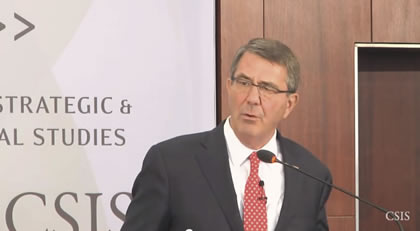
CSIS
Secretary of Defense Ashton Carter appeared at the Center for Strategic and International Studies April 5, saying that Russia and China are the primary enemies of the United States. |
In parallel, you have the largest ever U.S.-South Korean military exercises until late April, also involving many troops. The Philippine exercise includes an amphibious landing to simulate taking one of the disputed islands in the South China Sea. The Philippine military is also sending a U.S. high-mobility artillery rocket system designed to shoot down aircraft. It is the first time that these exercises have included Australia and Japan, in the effort to build a quadrilateral military counter-alliance to China.
Now other things are taking place in the region. Two weeks ago, the Philippines allowed the United States to have access to five of its bases near the disputed waters in the South China Sea, and they renewed the Enhanced Defense Cooperation Agreement. Now this is against the Philippine constitution, but they bypassed it by allowing the U.S. troops within Philippine bases, so that the Constitution would not apply. Now also Japan has a new national security law which went into effect last Tuesday; the national Diet passed a new security bill breaking away from the pacifist Constitution of Japan, in order to enhance the alliance with the United States, and with it, the power to exercise the right of collective self-defense.
Now, the whole world is watching: Does this mean that Japan is going to go back to its militarist past?
There is a tendency in Japan right now, to move into alliances with other claimants of the contested territories [in the South China Sea] to contain Beijing.
Now where is all of this leading? China’s position concerning these waters is written in what it calls the Nine Dash Line in the South China Sea, and China claims that these are territories which historically have belonged to China, including the right to reclaim land and build bases on the Spratly Islands. China also says—and it is true—that this does not represent a violation of the freedom of the seas. It will only improve the living conditions of the people there and improve protection against pirates, without hindering the passage of other ships.
The Philippines in 2013 filed a case in the International Court in the Hague, insisting on its right to exploit the South China Sea waters in its 100-nautical-mile exclusive economic zone, as defined in the UN Convention on the Law of the Sea. China did not accept to be a party to this case—which is its perfect right—but is questioning the legitimacy of the case. The court should have at that point dismissed the case, but it accepted it, and the ruling is expected at the end of April or beginning of May. The Chinese Defense Ministry said that it has the absolute right to then declare an Air Defense Identification Zone (ADIZ).
Now at the Nuclear Security Summit in Washington, which has just taken place, President Xi, in a discussion with President Obama, told Obama that China would not accept any behavior in the guise of freedom of navigation that violates its sovereignty in this region. One day later—exactly one day later—the United States announced a new patrol near the disputed islands in the South China Sea, and U.S. Navy officials announced that they plan to conduct more and increasingly complex exercises in the future. So the United States is playing a chicken game against China, increasing the tension over violations of opposite claims, in anticipation of the Hague ruling, to create an atmosphere in which, they hope, China would not dare to set up an ADIZ.
But China has already said that it will defend its rights in the South China Sea. So the question is, could there be a war between the United States and China over some relatively worthless rocks and reefs in the ocean? Could it be that the United States will go to a war with China on the Philippines’ behalf?
Obviously the South China Sea is of geographical significance for China, but the interest of the United States is geopolitical, and it uses the same reasoning as in the Trans-Pacific Partnership (TPP) to affirm its right to set the rules in Asia. The United States insists that it will defend a unipolar world, that it is the only superpower, and that it will not allow any other nation to meddle in that status. Obama’s claim that Russia is only a regional power is absurd, given that Russia has a nuclear arsenal which is a complete strategic match to that of the United States. And Putin has just executed very brilliantly a military flank in Syria against ISIS, demonstrating that Russia is absolutely needed if you want to have political solutions. Russia played a positive role in the P5+1 negotiations with Iran, and is now making possible the end of the war in Syria and helping to end that war. There are many leaders in the world who have said that, without Russia, you cannot solve existential problems such as terrorism, ISIS, and the refugee crisis in Europe.
Imperial Intention Contested
One should recall that these territorial disputes in the South China Sea are the result of the imperial intention dating back to the Versailles Treaty and the Paris Peace Conference in the aftermath of World War I in 1919, whereby the former German colonies in the Pacific Islands north and south of the Equator were given in part to Japan, which at that time caused a tremendous sense of injustice in China, leading to the May Fourth Movement. All the people in China thought the Versailles Treaty was a complete fraud. And as we know from European history, it laid the seeds for World War II.
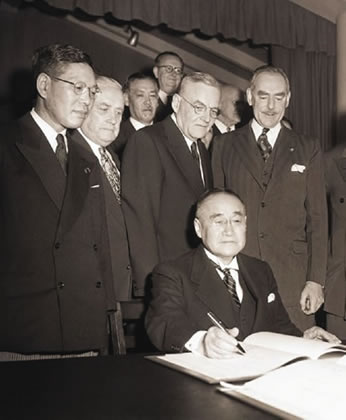
British system/Wall Street operative John Foster Dulles played a leading role creating the conditions for the South China Sea Conflict at the April-June 1945 formation of the UN at the San Francisco Peace Conference, by excluding China from participation. Here, Dulles (standing second from the right) witnesses the Japanese signing of a security treaty with the United States, Sept. 8, 1951, by then Prime Minister Yoshida Shigeru. |
The same game was repeated at the San Francisco Peace Conference after World War II, where John Foster Dulles arranged for China to be excluded, despite the fact that China had the highest casualty rate in Asia against the Japanese, and fought the longest. But the Western powers drew the map in Eastern Asia without China, and John Foster Dulles deliberately declared certain Asian frontier territories to be without owners, an old imperial trick to manipulate future conflicts, as was the case with the Sykes-Picot Agreement for Southwest Asia and the 1919 Trianon Treaty for the Balkans.
The fact is that the unipolar world has already ceased to exist. It is a fact that China is rising; the United States is losing its hegemony. China is already exporting many more technologies than the United States. It is educating far more scientists and engineers, and the word in the science community internationally is, if you want to get anything done in frontier science, the place to go is China.
So China, except for a couple of minor corrections in its stock market, is doing very, very well economically. Do not believe what the New York Times is trying to tell you every day. Because China has embarked on the policy of the New Silk Road and the Maritime Silk Road—the One Belt, One Road policy—for huge projects to connect all of the countries of Eurasia through infrastructure development and high technology investments. It is so attractive that 60 nations are already cooperating with China. It has created, together with other BRICS countries, a complete, alternative economic system that includes the Asian Infrastructure Investment Bank (AIIB), which has immediately had 60 founding members, despite the United States bringing enormous pressure on everyone not to join it; the New Development Bank, which is now already operating; the New Silk Road Fund and Maritime Silk Road Fund; and many other such institutions. There is a tremendous attractiveness of this program for a New Silk Road in the spirit of the ancient Silk Road in all of Asia, where people are now all talking about increasing Asian connectivity.
The investments of these new banks are going into exactly the sectors that were denied for decades by the International Monetary Fund (IMF) and the World Bank—namely into infrastructure. And all of these countries are thirsty and hungry for exactly these kinds of developments. Many countries have recently expressed interest in becoming transport hubs for the New Silk Road and the Maritime Silk Road. Indonesia wants to become a hub. Sri Lanka, Afghanistan, Iran. The New Silk Road is moving very, very rapidly in all of Eastern Europe. Just now, when President Xi Jinping was in Prague on a state visit to the Czech Republic, President Zeman praised the New Silk Road and emphasized the role of Prague, the Golden City, as the gateway between Europe and China. The 16+1 countries have just met in Riga, Latvia—these are the 16 East European and Central European countries—and they all want to be connected to the One Belt, One Road policy.
So this is moving very, very positively.
Trans-Atlantic Desperation
You contrast that with the trans-Atlantic sector: The too-big-to-fail banks of Wall Street and London are completely bankrupt, and faced with an immediate financial crash—much, much worse than what happened in 2008, a crash in which the entire $2 quadrillion in outstanding derivatives could blow up at any minute. Furthermore, the so-called tools of the central banks no longer function. As a matter of fact, every time a central bank does something to correct the problem, it boomerangs and has the opposite effect, as in the case of the Bank of Japan, of Norway, or the European Central Bank. When they go to zero interest rates, or even negative interest rates, it furthers the deflationary collapse instead of stimulating the real economy.
Just how desperate the situation in the trans-Atlantic system is, can be seen from the talk of the head of the European Central Bank, Mario Draghi, about helicopter money. Now that was, if you remember, an invention of Federal Reserve Chairman Ben Bernanke—the idea that, to avoid a meltdown of the entire financial system, you just fly helicopters over cities and throw down money, as much as is needed to prevent a meltdown. Now this obviously has caused a complete uproar in Germany, because people in Germany remember what the hyperinflation of 1923 was all about.
Then look at the condition of Europe. Look at the refugee crisis, which is not being discussed much. But the reality is that it is the result of the wars conducted mostly by the United States and the British in the Middle East, wars which were all based on lies. Iraq—no weapons of mass destruction. The war against Libya was initiated by a lie in the UN Security Council that it would not be a war. Look at Afghanistan: Was September 11 really as it was presented? Look at the situation in Yemen and in many African states.
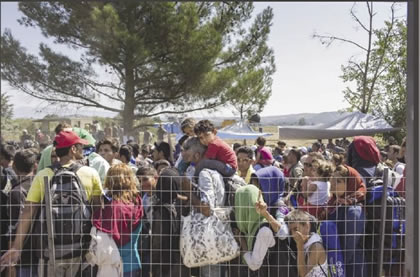
UNHCR/I. Prickett
Refugees fleeing certain death are being deported on a grand scale from internment camps in a complete violation of human rights. |
The refugee crisis, the biggest humanitarian crisis probably since the end of the Second World War—condemning so many to unbelievable fates—has revealed that there is no European Union (EU), because there is no union. There is no unity. There is no solidarity. You have now a situation in which children are stuck behind barbed wire and police are shooting at them, trying to force them back. And then there is an absolutely shameful deal between the European Union and Turkey which—according to documents just delivered to the UN Security Council—is still supporting ISIS.
In Germany politicians are saying, “Oh, now we have fewer refugees.” Yes, but at what price? They are being deported on a grand scale from internment camps in Greece, and it is a complete disgrace. Even the UN Human Rights Commission said this is a complete violation of human rights. It violates the Geneva convention on refugees. And all the aid organizations have already left because, they say, under the prevailing conditions, they cannot do their work. Doctors without Borders, for example, and many others.
The ‘Clean Hands’ Game
So the world is clearly in a complete mess, in a condition of disintegration, and what is the answer of the leading institutions of the trans-Atlantic sector? They have just pulled a big rabbit out of the hat called the Panama Papers. Now, one year ago, an anonymous source—such anonymity is always dubious—gave to the Süddeutsche Zeitung 11.5 million documents, which contained 40 years of data concerning the firm in Panama called Mossack Fonseca, which specializes in creating letterbox firms for the purpose of tax evasion. The International Consortium of Investigative Journalists then deployed 400 reporters in 80 countries for one year—financed by whom? By George Soros. The documents target politicians, industry leaders, sportsmen, and others.
Immediately, naturally, the focus was on Putin, even though his name is nowhere to be found in these documents, and on Xi Jinping. The New York Times has not wasted a day since the release, promoting this attack on Xi Jinping.
Let’s look at this operation: What is this? Jürgen Mossack, one of the founders, is the son a member of Hitler’s Waffen SS. Ramón Fonseca Mora, the other guy, is the former president of the Panameñista Party, a party founded by Arnulfo Arias Madrid, an open Hitler supporter. The party was actively involved in the overthrow of General Noriega. The old Mossack was a member of the Nazi Waffen SS and after the war, offered his services to the U.S. government as an informant. Now that is entirely the profile of the Dulles brothers’ famous rat line, by which they transported Nazis from Germany via the rat line to South America, to deploy them there for other purposes.
The focus on Xi Jinping is obviously especially ridiculous, because if there is one political leader in the world who is conducting an anti-corruption campaign in a completely ruthless fashion, then it is him. So, what is the purpose of this? Obviously, it is part of the present, trans-Atlantic hybrid warfare against Russia and China, with the aim of regime change by a variety of means: color revolutions using NGOs financed by foundations that are probably in this tax-exempt scheme; sanctions; and now the Panama Papers with the obvious hope of steering an uproar among the respective populations.
And it has almost worked in the case of the Icelandic President—people are now gathered in front of the residence of President Olafur Grimsson—but this m.o. is really not a new one. The way this has been functioning for a very long time is, you use certain assets owned by the governments, or secret services, and allow criminal operations and behavior to go on for a very long time. And then, at a convenient moment, you blow it up, and you cause a shake-up.
This was done very efficiently in the 1990s in Italy, with an operation called “Clean Hands,” a national juridical investigation into political corruption that blew up the political system, ending the so-called First Republic of Italy, because all the parties were implicated. Anybody who has travelled to Italy knows that the entire postwar system of Italy was based on a principle called “amici di amici.” You may not approve of it, but that’s what it was: You couldn’t get a job done without some kickback, and public works would always involved some bribes. The whole operation of bribes for public works was called Tagentopoli, or in English, “Bribesville.” At that time, it involved 5,000 public figures and half of the Italian parliament. More than 400 city and town councils were dissolved, and the annual bribe rate in the 1990s was estimated to be $4 billion.
Now, Bloomberg recently reported that the Brazilian “anti-corruption” campaign against Dilma Rousseff, one of the BRICS leaders, is based on the Italian model. It is called “Operation Carwash.”
So what they do is, they operate by a system of plea bargains, turning mafia bosses into snitches, and that way, you can roll up the whole political system. Now what comes out there is very interesting, because it reveals the total criminal character of the entire trans-Atlantic financial system. In the case of Mossack Fonseca—which is only the fourth largest of such firms, so one has to assume that there are many, many more such cases—it turns out that the HongShang bank [Hongkong and Shanghai Banking Corporation, HSBC] is responsible for 20% of these letterbox firms, and then comes the Union Bank of Switzerland and Crédit Suisse. And almost all the German banks are involved.
So what do you do when you have such a problem? The only way to stop this is, obviously, what Franklin D. Roosevelt did in 1933, when he obtained the Glass-Steagall Act requiring separation of the banks, simply bankrupting the fraudulent parts, and that is exactly what is required today: You need to separate the banks, protecting the commercial banking operations and closing down the derivatives, the toxic waste paper. Then you need a Pecora Commission to look into who committed what crime, and for what purpose.
Now, the funny thing is that when British Chancellor of the Exchequer George Osborne was asked, what about the fact that the father of Prime Minister David Cameron is also now a target in the Panama Papers, he said, “Oh, that is a private matter”! So it is quite amazing what nerve these people have.
So, the FDR solution for the United States. Then, we need to put down all of these crises, and I think it is absolutely feasible, but one has to take the path demonstrated by the negotiations between Secretary of State John Kerry and Foreign Minister of Russia Sergey Lavrov, in the case of Syria. There has to be a political agreement.
The Ideal Moment is Now!
But then, you need a huge development program. You need to do exactly what President Xi Jinping offered when he was in Iran, namely, to extend the New Silk Road—the One Belt, One Road policy—into the entire Middle East. Because you will not stop terrorism by dropping more bombs! If you launch more drones and drop more bombs, for every terrorist killed you will create a hundred new ones who hate the West even more than before.
So that is no solution. Obviously, ISIS has to be fought, and has to be gotten rid of, but you need a development perspective for the entire region, from Afghanistan to the Middle East, to the Mediterranean, and from the Caucasus to the Persian Gulf. And we need to wage war on the desert: We have to have a new source of fresh water, which is eminently possible with peaceful nuclear energy and desalination of large amounts of ocean water. We need to build new cities and develop agriculture and industry, so that the people of Syria, and Iraq, and Afghanistan, and Yemen, and Tripoli in Libya, and many, many African countries, have a future!
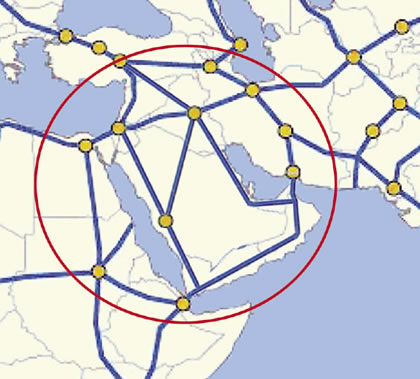
EIRNS
Maps depict routes for extending the New Silk Road Land-Bridge development corridors throughout the Middle East. Such a huge development perspective “from Afghanistan to the Middle East, to the Mediterranean, and from the Caucasus to the Persian Gulf,” is the only way to eliminate regional conflict and the resultant refugee crisis. |
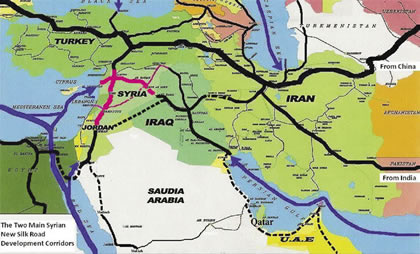 View full size View full size |
Why can we not take the offer of Xi Jinping to enter into a win-win cooperation with the large neighbors of the Middle East, Russia, China, India, Iran, and Egypt, and build up the Middle East in a Marshall Plan/New Silk Road fashion? The only reason why I mention the Marshall Plan, is that it reminds people that you can rebuild war-torn regions with a crash program. I know that China doesn’t want to use this word, because the Marshall Plan has such a Cold War connotation; but we need to have a New Silk Road perspective.
The same applies, obviously, to settling the Ukraine crisis. You have probably heard that yesterday, the Dutch people voted in a referendum against the EU Association Agreement for Ukraine. This is very, very good: It means that this horrible EU is one step closer to its dissolution because, if you remember, it was the EU Association Agreement which was supposed to be signed by Yanukovych in late 2013 at the summit in Vilnius that started the whole Ukraine crisis.
Yanukovych realized at the last moment that because it would have given NATO total access to the territory of Ukraine, it would have made possible economic warfare against Russia, because of its border with Russia and the agreements between Ukraine and Russia. So at the last moment he did not sign. Then you had the color revolution, the Maidan events, all of these things developed. If you look at the chronology of these events, it was not Russia acquiring the Crimea; in every single instance, Russia reacted to a provocative action by NATO and by the EU, including a fascist coup in Ukraine in February 2014.
So if you want to solve this problem now? Well, this is the ideal moment, because the EU Association Agreement with Ukraine has just detonated, and it cannot be implemented. The results, announced today, of a Dutch referendum on whether to support that agreement, 61% of the voters were opposed. Even though only 32% of the Dutch people voted, the Netherlands government does not dare to go along with it, because there are many people in the 68% who did not vote who don’t like the EU, because remember, Netherlands and France were the only two countries who voted against the EU Constitution in 2005.
So the ferment against this dictatorship which the EU has become, is just too big. And the lament today in the European media about the failure of this agreement is just absolutely loud and noisy.
OK. Let’s use this situation, where, if there is one veto, this agreement cannot go through, let’s use it to say: “Stop the confrontation with Russia!” Extend the European Union and the Eurasian Economic Union of Russia into one Eurasian area from the Atlantic to the Sea of China. Let’s extend the Silk Road perspective to include Ukraine and develop it! Because Ukraine is economically absolutely finished! The people are living a horrendous life as the result of what has happened in the last three years.
Let’s do the same thing for Africa. Do people really think that we can sit there, and the 1% of the rich become richer and richer, by means which we now get a better window on with the Panama Papers, and the majority of the people lose everything? The middle class become the poor, and the poor have shortened lives. The gap between rich and poor worldwide is becoming bigger and bigger, and one billion people go hungry every day.
Klaus Schwab, the director of the Davos Economic Forum, said a couple of months ago that if present trends do not change, it is expected that one billion people will come as refugees to Europe in the next years. If it comes to that, and you have the effort to use NATO and Frontex—military ships—to fire on the refugees to try to deter them, what remains then of the “European values”? What about our humanism? What about any value?
So why don’t we take the New Silk Road and say, “We now have a very attractive economic model which is already functioning very well in 60 nations of the world, so let us join hands, the United States, and Russia, and China, and European nations, and develop Africa.” This is the moment at which we have to have a grand vision to change the plight of so many people.
Right now in Germany, there is one minister, the Development Minister Gerd Müller, who has travelled extensively in Southwest Asia and Africa, and who is now saying repeatedly—it’s a big step forward—“we need a Marshall Plan, we need to develop these countries, because otherwise, they will bring all their problems to Europe.”
And let’s convince Japan that it is not in its interest to be drawn into military adventures against China. Japan is a country very much like Germany, which has almost no raw materials and achieved a very high living standard through high rates of investment in science and technology and by exporting. For Japan, the natural export market is all of Asia and Africa. It should be part of such a new world economic system and not go the way the Bank of Japan is now going, to zero interest rates, negative interest rates, and plunging deeper and deeper into the deflation.
And the United States?
Is the United States so much above the need for a New Silk Road? If you travel the roads from Washington to New York, or even on the roads in New York,— I don’t understand why the citizens are not in an uprising against about the condition of these roads! They are so bad, that the roads in East Germany—at the end, before it collapsed—were smooth compared to what you have here! So the United States would obviously profit from joining the New Silk Road, in building infrastructure! China had built 20,000 km of fast-train railroads by the end of last year, and it plans to have 50,000 km by 2025 or 2030, in any case, in a very short period of time. And the United States has built how many miles of fast-train railroads? Zero!
So we propose that the United States—rather than wasting its industrial capacity in an ever-growing military-industrial complex, trying to militarize the whole world—should transform these industries and build fast trains, build maglev trains, or import the Chinese fast-train system, which is excellent. It’s smooth, it’s quick, and it doesn’t shake at all like the European fast trains. So build 50,000 miles of fast train railroads in the United States! Fight the desert in the Southwest of the United States! Build a couple of new cities, you know? Large parts of the United States are completely undeveloped. Basically, after Teddy Roosevelt, no new cities were built in the West. Build some “smart cities,” modern cities based on modular systems, but make beautiful cities! That would be a real challenge, to build beautiful cities, and not more Houstons.

NTSB
The United States is in dire need of the development benefits that would be supplied by the New Silk Road development initiative. Above, site of the deadly Amtrak train wreck in Philadelphia, May 12, 2015. |
We have put this program on the table: The New Silk Road Becomes the World Land-Bridge.
One reason we have proposed development for the entire world is that multipolarity is not the answer to a unipolar world. If you have multiple poles—groups of nations which still maintain their interests against other groups of nations—you still have the seed of geopolitics. And geopolitics is what caused two world wars in the Twentieth Century; if we were to come to a new world war, it would result in the annihilation of all mankind. The idea that you can have a limited war somewhere in the Pacific or somewhere in Europe, is complete bunk. All the military experts we have talked to, top-level military in Europe, the United States, and elsewhere, are convinced that it is in the nature of the existence of thermonuclear weapons, that it would come to a general, global war, if you start a war somewhere.
We need to replace geopolitics with a new paradigm, a paradigm which must be as different as was the Middle Ages from what we call “modern times.” The Middle Ages was the time of scholasticism, superstition, the flagellants, people just going crazy, believing in Aristotle; and when Nicholas of Cusa and other great thinkers organized the Italian Renaissance, they designed a completely new paradigm which defined the role of the individual in a completely different way. It established the sovereign nation-state devoted to the common good for the first time; it made scientific and artistic progress possible in ways absolutely unknown before.
And we need, today, a completely new paradigm. If we cannot lift our thinking above the present, petty, so-called self-interest, the so-called “national interest,” or really the interest of the big corporations and Wall Street, then we will not survive as a human species. What we need is an image of man, which is of man as the only creative species—to the best of our knowledge so far. In the Chinese Confucian philosophy, there is the word or the notion of ren, which is almost the same thing as the concept of agape, of love, in Christian humanism: that you have to have love for, and sustain harmonious relations with your family, your neighbor, your nation, and the international community of nations.
Now, the human species has come a very long way in a very short period of time. If you think about the last 10,000 years, we have produced quite a number of great minds: Confucius, Plato, Mencius, Nicholas of Cusa, Kepler, Leibniz, Bach, Schiller, Beethoven, Tagore, Vernadsky, and Einstein, just to name a few—and that is how people should be.
A ‘New Normal’
 Purchase from the LaRouche Publications Store |
Now, you say, “These are people who are so extraordinary, that they only come once in a century.” I don’t think so. If we go now for the kind of reform that we are talking about, and you eliminate poverty, then no child, no person on the entire planet would be deprived of his or her basic needs. Then give all the children of this planet a universal education, giving them access to the great discoveries of the past; teach them Classical art; give them the kind of morality which used to be associated with Christian humanism, or with Buddhism, or with Confucianism, or other great cultures of this planet. The elimination of hunger and poverty is the best possible step for human rights! Because being poor and hungry does not allow you to exercise your human rights.
So if we take this road and say, Let’s have a plan of global development, let’s stop geopolitical wars, let’s join hands to work together—so that every child of the future can have a perspective to become a scientist, to become a teacher, an artist, to become an astronaut or some other beautiful thing that develops the human mind—then, I think we need to go back to the high traditions of our own cultures. The Americans have to become republicans again, like the Founding Fathers—Benjamin Franklin, Alexander Hamilton—and like Lincoln, Roosevelt, and Kennedy. In Germany we need to go back to the German Classics. In other nations, we have high points of culture, which we have to revive.
And then we have to relate to each other from the standpoint of the highest form of our culture, and relate to the highest form of the culture of the other nation.
Then we will have a human world.
We should not give up on the idea that mankind is human! And that is what we have to fight for right now. So I think, if we do that—to speak in contemporary English—the “new normal” will be that every person is a genius.
